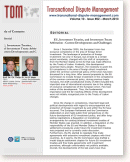Many thanks to Felix A. Koechel, researcher fellow of the Max Planck Institute Luxembourg for International, European and Regulatory Procedural Law. This contribution summarizes a presentation he made at one the Institute’s weekly seminars (the so called “Referentenrunde”), which are held every Wednesday from 2 p.m. to 4 p.m.
Prior to the German Federal Supreme Court’s decision in December 2012 (see here), the Italian Corte Suprema di Cassazione (Supreme Court) already in April 2012 was called upon to decide on Jurisdiction over damage claims brought by investors against rating agencies based in New York (Cassazione, 22 May 2012, No. 8076).
In January 2007 one of the three claimants, a stock company based in Bologna (Italy), purchased from another company based in London shares of a company based on the Cayman Islands. After the conclusion of the contract in London, the shares were pooled on the claimant’s bank account in Bologna, and subsequently transferred to two further corporations equally based in the region of Emilia-Romagna and acting as claimants. The decision to acquire the shares was allegedly motivated by positive ratings awarded by the defendants (two rating agencies based in New York) as to the financial standing of the issuer. There was, however, no contractual relationship or even direct contact between the claimants and the defendants. By July 2007 the shares had already lost 80 % of their initial nominal value while it was not before August and December 2007 that the initial ratings were downgraded. Therefore, the claimants sued the defendants in Bologna for damages allegedly suffered as a consequence of both the initial inaccurate rating and the tardive downgrading. The Court of first instance referred the question of jurisdiction to the Italian Supreme Court by means of the regolamento preventivo di giurisdizione (Article 41 of the Italian Code of Civil Procedure).
Although the facts of the Italian and the German case are similar, their outcomes differ considerably: The Italian Supreme Court declined jurisdiction on the grounds of Article 5(3) of Regulation (EC) No 44/2001. Not only is the application of the aforesaid Regulation noteworthy but the case more importantly gives an example of the problems arising from Article 5(3) Brussels I in case of merely financial damages.
Attentive readers of conflictoflaws.net know that according to Article 3(2) of Law No. 218 of 1995, in Italy the special rules of jurisdiction of the Brussels Convention apply even if the defendant is not domiciled in a contracting state (see here). Although it is controversial whether this reference should be read as referring to the Brussels I Regulation, both courts and scholars have clarified that to this date, and lacking the Italian legislator’s intervention, the reference has to be interpreted as designating the Brussels Convention (cf. Cassazione, 21 October 2009, No. 22239; cf. Pocar in Riv. dir. internaz. priv. proc. 2011, 628 ff.). It is therefore likely that the application of the Brussels I Regulation in the present case is due to the very specific wording of the question referred by the Bolognese court and may not be misinterpreted as a change in case law. Taking into consideration the continuity between the Brussels Convention and the Brussels I Regulation in the specific case of Article 5(3) this question should have been without prejudice to the Court’s decision.
In fact, Article 5(3) was the only ground of jurisdiction at hand that could have led to an Italian forum since the Italian legislator has refrained from introducing additional (exorbitant) fora. It is shown particularly in comparison with the German case that the progressive and courageous “Europeanization” of the national rules on international jurisdiction at that time came at the price of possible disadvantages for Italian claimants.
Regrettably, the Court does not address extensively the problems arising out of Article 5(3) in the case of financial damages. In line with the ECJ in Marinari (C-364/93), the Court narrows down the Article 5(3) notion of “place where the harmful event occurred” to the place of the initial damage. According to the Italian Court, this initial damage consists of the acquisition of the shares at an excessive price. Apart from that, the Italian Court neither refers to the principle of ubiquity nor to the relevant and more recent ECJ case law regarding financial damages in Kronhofer (C-168/02). While the localization of the initial damage in London can be well accepted, the Italian Supreme Court missed the chance to contribute to the discussion on the interpretation of Article 5(3) in case of financial damages. It is to be hoped that the financial crisis with its rising flood of claims against rating agencies will shed some light on the problem.




 The last issue of the Revue critique de droit international privé was just released. It contains five articles and several casenotes. A full table of contents can be found
The last issue of the Revue critique de droit international privé was just released. It contains five articles and several casenotes. A full table of contents can be found 